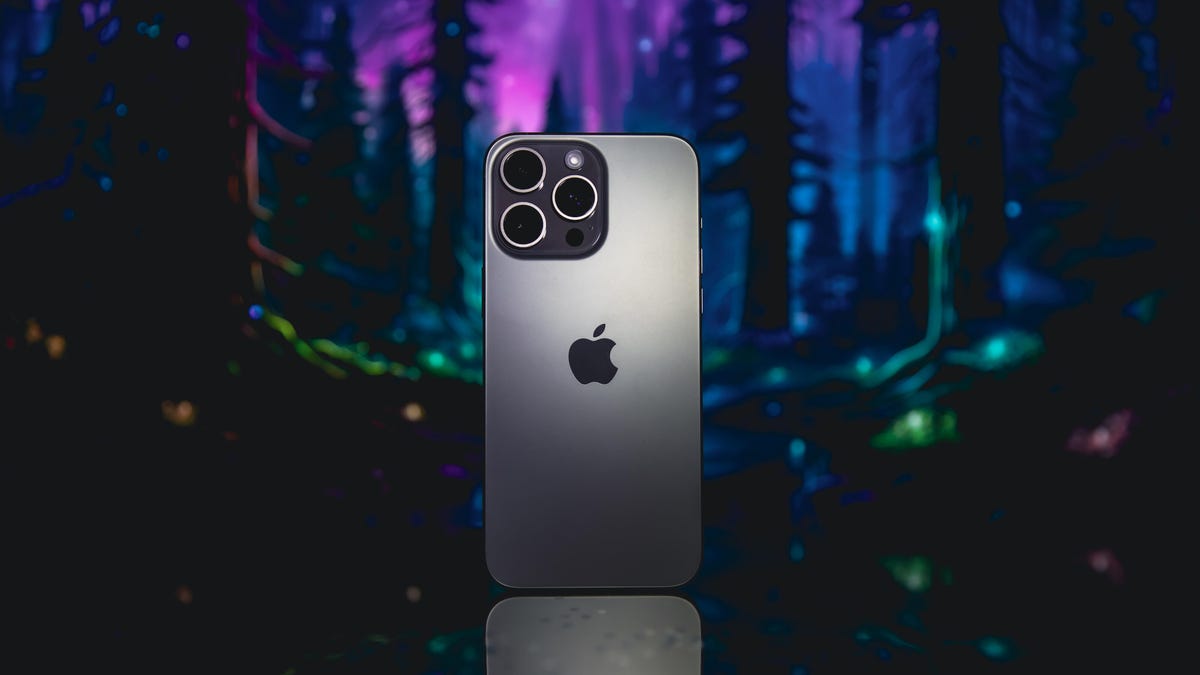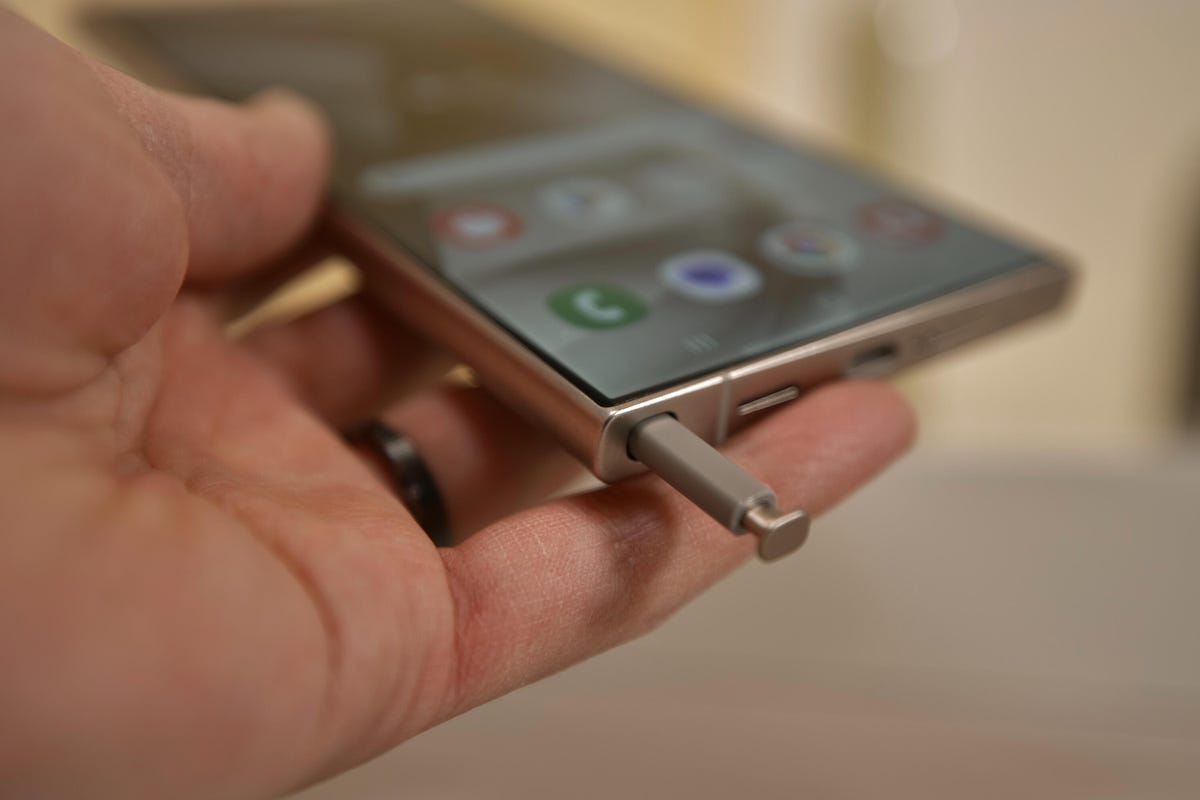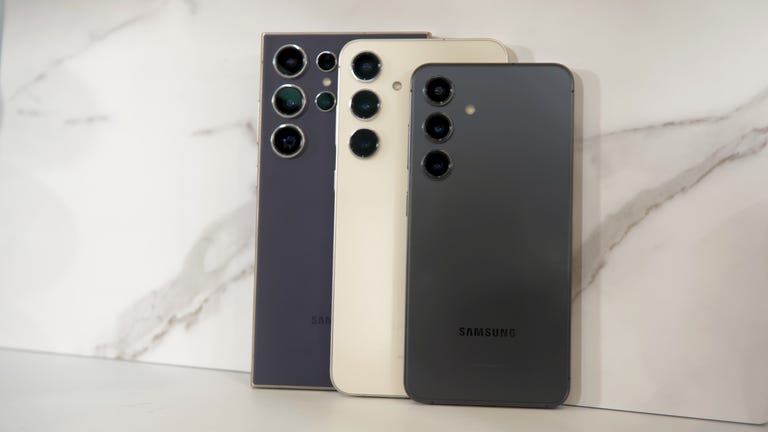Samsung unveiled the brand new Galaxy S24 Ultra at its Unpacked event. If you’re a Galaxy owner thinking of upgrading, you may wonder how this new flagship phone compares to last year’s Galaxy S23 Ultra (especially since you can find the S23 Ultra for less now that the S24 Ultra is available). Or, if you’re trying to decide between Samsung and Apple, you may be curious how the top-of-the-line S24 Ultra compares to the premium iPhone 15 Pro Max. Let’s break down the specs so you can get a better idea of which phone is right for you.
Last year’s S23 Ultra had a starting price of $1,200 after its release in the US and now starts at $875, while the new S24 Ultra starts at $1,300. The iPhone 15 Pro Max, on the other hand, starts at $1,200. So the base S24 Ultra is $100 more than the base 15 Pro Max, and $100 more than its predecessor was upon its release. (See the chart below for UK and Australian pricing.)
Read more: Best Phone to Buy for 2024
The S24 Ultra has Qualcomm’s latest Snapdragon 8 Gen 3 chip, which is designed to support on-device AI processing. More specifically, the S24 Ultra has a suite of generative artificial intelligence features, which the company calls “Galaxy AI.” You can, for example, live-translate calls, turn videos shot at normal speed into slow-motion videos or remove unwanted shadows from your photos. CNET’s experts will evaluate all of these AI features in our testing.
We also saw AI photo editing tools in Google’s Pixel 8 series. There’s a Best Take feature, for example, that allows you to swap your favorite facial expression from a sequence of pictures into another photo from the same sequence where you perhaps don’t like your expression as much.
Read more: Google Pixel 8’s ‘Best Take’ Levels Up AI-Enhanced Photos
The S23 Ultra uses last year’s Snapdragon 8 Gen 2 processor. It doesn’t have Galaxy AI yet, but is expected to get it eventually. The iPhone 15 Pro Max has Apple’s latest A17 Pro chip but doesn’t currently have any generative AI photo editing tools like the Galaxy S24 Ultra or the Google Pixel 8 line. I’m interested to see if the iPhone will ever get features like these, especially because AI is such a buzzword right now.
The S23 Ultra runs on Android 13 which will get four years of software and security updates. The S24 Ultra runs on Android 14 which will support 7 years of these updates. The 15 Pro Max runs on iOS 17, and while Apple doesn’t disclose how long it will support its phones with software updates, iOS 17 currently works on models dating back to the 2018 iPhone XS and XR.
The base S23 Ultra comes with 256GB of storage and either 8 or 12GB of RAM. You can also upgrade to 512GB or 1TB storage options, both with 12GB of RAM. The S24 Ultra comes with the same storage options, but all of them have 12GB of RAM. So Samsung has eliminated the 8GB RAM option on its base S24 Ultra model. While Apple doesn’t disclose the RAM on its iPhones, the 15 Pro Max comes with the same storage options as the S23 and S24 Ultra: 256GB, 512GB and 1TB.

This is the back of the iPhone 15 Pro Max.
All three of these phones have a USB-C port, which is a big deal because all iPhones before the iPhone 15 series either had Lightning ports or 30-pin connectors. The S23 and S24 Ultra support 45-watt fast charging, while the 15 Pro Max supports 27W fast charging. All three phones offer wireless charging, but the Ultras also support reverse wireless charging so you can juice up other devices from the back of these phones. All three phones come with charging cables, but none of them include a charger brick in the box.
The S23 and S24 Ultra have a 5,000-mAh battery. In her S23 Ultra review, CNET’s Lisa Eadicicco found that after 12 hours of use (using the phone to take photos and videos, check her email and socials and stream music), her battery was at 66%. The new model is supposed to have a stronger battery because of its new chip, so we look forward to putting the S24 Ultra’s battery to the test. Apple doesn’t disclose battery capacity, but says the 15 Pro Max has an “all-day battery life” with “up to 29 hours of video playback.” In his 15 Pro Max review, CNET’s Patrick Holland found that after 15 hours of use, the phone usually had 20% to 25% battery left.
The S23 and S24 Ultra both come with the S Pen stylus that you can store inside the phone. I’d love to see something like this for the iPhone, but it doesn’t exist at the moment. Maybe one day. (Tim Cook, I hope you’re reading this.)

Both the S23 and S24 Ultra have built-in storage to house an S Pen stylus.
The S23 and S24 Ultra both have a 6.8-inch AMOLED display and a 1 to 120Hz variable refresh rate that changes based on how you’re using your phone. So if you’re doing something with lots of screen movement, like playing a video game, the refresh rate will increase. But if you switch to an activity that doesn’t take a lot of movement, like reading an article, the refresh rate will go down. The 15 Pro Max has a 6.7-inch OLED display and also has a variable refresh rate of 1 to 120Hz.
The S23 and S24 Ultra phones don’t have a notch. They just have a hole-punch camera at the top of the screen. The 15 Pro Max does have a notch in the form of the Dynamic Island, a shape-shifting cutout that allows you to view updates from apps like Maps without needing to have them open.

Watch this: Samsung Reveals Its New S24 Series Phones and Their AI Chops
As for how these phones will feel in-hand, the S23 Ultra is 8.9 millimeters thick, the S24 Ultra is 8.6 millimeters thick and the 15 Pro Max is 8.25-millimeters thick. The S23 Ultra has an aluminum frame and weighs 234 grams. The S24 Ultra and 15 Pro Max have titanium frames and weigh 233 grams and 221 grams, respectively. So the 23 Ultra is slightly thicker and heavier than the S24 Ultra and 15 Pro Max, and it has an aluminum frame (rather than titanium).
The S23 and S24 Ultra cameras are similar. Both phones have a four-camera system with identical selfie, ultrawide, wide and 3x telephoto cameras. Each phone also has another telephoto camera for extreme distance shots. The one on the S23 Ultra is 10 megapixels with a 10x optical zoom, while the one on the S24 Ultra is 50 megapixels with a 5x optical zoom. So the S23 and S24 Ultra cameras are basically the same except for that new 50-megapixel, 5x telephoto camera, which is supposed to take sharper zoom photos.
The iPhone 15 Pro Max, on the other hand, has a three camera system. There’s a 48-megapixel main camera, a 12-megapixel ultrawide camera and a 12-megapixel telephoto camera with a 5x optical zoom. And for your selfies, there’s a 12-megapixel front camera. So both the S24 Ultra and the 15 Pro Max have a 5x optical zoom, but the sensor on the S24 Ultra has a higher resolution. Stay tuned for our camera tests to see how the S24 Ultra camera performs in real life, especially against the 15 Pro Max.
For more on how the Galaxy S23 and S24 Ultra and the iPhone 15 Pro Max compare, check out our specs chart below.
Samsung Galaxy S24 Ultra specs vs. Samsung Galaxy S23 Ultra, Apple iPhone 15 Pro Max
| Samsung Galaxy S24 Ultra | Samsung Galaxy S23 Ultra | Apple iPhone 15 Pro Max | |
|---|---|---|---|
| Display size, tech, resolution, refresh rate, brightness | 6.8-inch AMOLED; QHD+ resolution; 1-120Hz adaptive refresh rate | 6.8-inch AMOLED; 3,088×1,440 pixels; 120Hz adaptive refresh rate | 6.7-inch OLED; 2,796×1,290 pixels; 120Hz adaptive refresh rate |
| Pixel density | TBD | 500 ppi | 460 ppi |
| Dimensions (inches) | 6.40 x 3.11 x 0.34 in | 6.43 x 3.07 x 0.35 in | 6.29 x 3.02 x 0.32 in |
| Dimensions (millimeters) | 163 x 79 x 8.6 mm | 163.3 x 78 x 8.9 mm | 159.9 x 76.7 x 8.25 mm |
| Weight (grams, ounces) | 233 g (8.22 oz) | 234 g (8.25 oz) | 221 g (7.81 oz) |
| Mobile software | Android 14 | Android 13 | iOS 17 |
| Camera | 200-megapixel (wide), 12-megapixel (ultrawide) 10-megapixel (3x telephoto) 50-megapixel (5x telephoto) | 200-megapixel (wide), 12-megapixel (ultrawide) 10-megapixel (3x telephoto) 10-megapixel (10x telephoto) | 48-megapixel (wide), 12-megapixel (ultrawide), 12-megapixel (5x telephoto) |
| Front-facing camera | 12-megapixel | 12-megapixel | 12-megapixel |
| Video capture | TBD | 8K | 4K |
| Processor | Qualcomm Snapdragon 8 Gen 3 | Qualcomm Snapdragon 8 Gen 2 for Galaxy | Apple A17 Pro |
| Storage and RAM | 12GB RAM + 256GB, 512GB, 1TB | 8GB RAM + 256GB; 12GB RAM + 256GB, 512GB, 1TB | 256GB, 512GB, 1TB (RAM undisclosed) |
| Expandable storage | None | None | None |
| Battery | 5,000 mAh | 5,000 mAh | Undisclosed; Apple claims up to 29 hours of video playback (25 hours streamed) |
| Fingerprint sensor | Under display | Under display | None (Face ID) |
| Connector | USB-C | USB-C | USB-C |
| Headphone jack | None | None | None |
| Special features | Titanium frame, 2,600-nit screen; 7 years of OS and security updates; 5G (mmWave); IP68 water resistance; wireless PowerShare to charge other devices; integrated S Pen; UWB for finding other devices; 45W wired charging (charger not included); Galaxy AI; Wi-Fi 7 | 5G (Sub6, mmWave); IP68 water resistance; wireless PowerShare to charge other devices; integrated S Pen; 100x Space Zoom; 10x optical zoom; UWB for finding other devices; 45W wired charging | 5G (Sub6, mmWave); Action Button, Always-On display, IP68 water resistance, MagSafe, Dynamic Island, 5x optical zoom (120mm equivalent), satellite connectivity, eSIM, thread networking technology |
| US price starts at | $1,300 (256GB) | $1,200 (256GB) | $1,199 (256GB) |
| UK price starts at | £1,249 (256GB) | £1,249 (256GB) | £1,199 (256GB) |
| Australia price starts at | AU$2,199 (256GB) | AU$1,949 (256GB) | AU$2,199 (256GB) |
Editors’ note: CNET is using an AI engine to help create some stories. For more, see this post.

